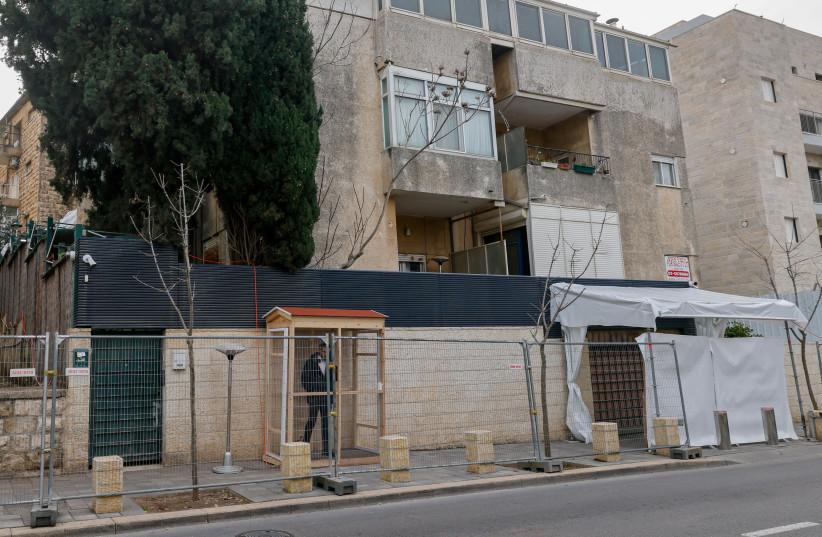Grapevine: Uncomfortable abode

Movers and shakers in Israeli society.
Holocaust survivor Mirjam Bolle is perhaps best known for her book Letters Never Sent, published by Yad Vashem in 2014. But to people who know her personally, she is a model of resilience and possible proof that the triple-digit ages of biblical personalities were not a fable, nor was time measured in a dramatically different fashion than it is today.
(It was indeed counted differently and may have had fewer months in the year, but it was calculated in accordance with the seasons, so the difference could not have been that great.)
After finally reaching Jerusalem, Bolle worked for a series of Dutch ambassadors.
For many years, she has been a member of the Hatzvi Yisrael congregation in Talbiyeh and lives close by. Because she is a very special person, the congregation’s committee honored her last Saturday with a kiddush in celebration of her 106th birthday.
For the record, Bolle is not an old lady in her dotage. Her mind is sharp, and she is physically in amazingly good shape. She remained standing throughout the kiddush as people approached her to congratulate her. As always, she was well groomed, and her back ramrod was straight. She can often be seen shopping at the supermarket or inspecting the latest fashions at downtown clothing stores.
Her book is about the letters that she wrote to her fiancé who had preceded her from Amsterdam to Jerusalem before the outbreak of World War II. The letters describe what conditions were like in Amsterdam during the Nazi occupation, and the concerns of the Amsterdam Jewish Council, of which she was secretary. They also describe her deportation to the Westerbork transit camp, then on to Bergen Belsen; her release in a prisoner exchange; and her harrowing journey to British Mandate Palestine through several countries in Nazi-occupied Europe, Turkey and Syria before she reached her destination.
The letters she wrote were never sent. She kept them in a shoe box that she took with her from place to place, and which miraculously were not confiscated. After her marriage, she put the shoe box in a drawer and left it until after the death of her husband. When the letters were published in book form, they caused quite a stir, not only in Israel but in her native Holland.
■
ONLY A short time after winning the National League championship, Hapoel Jerusalem basketball club acquired new owners – an investment group headed by Matan Adelson, the 24-year-old son of Miriam Adelson and her late husband, Sheldon. Since early childhood, Matan has been an NBA freak and has also shown an aptitude for business, sealing the deal last week.
After completing his university studies in the US in 2021, Adelson settled in Tel Aviv, where he works as a business analyst. A keen fan of Hapoel Jerusalem, whose games he attended regularly, Adelson is convinced that he can bring the team to even greater heights.
■
PEOPLE LIVING in and around Ahad Ha’am and Keren Hayesod streets used to have a fairly high opinion of real estate developer Nachum Rosenberger, who plans to build a hotel and residential units on the plot of land of the former President Hotel, which stands between Ahad Ha’am and Sokolov streets. In the past, Rosenberger was attentive to opinions expressed by local residents, but more recently he has become enamored with a larger project than originally intended.
At a recent meeting with his architects, residents learned that he now wants to build a 26-story structure that is far in excess of what has been permitted to any other developer in the immediate vicinity. The height will completely destroy the character of Talbiyeh, but worse still, will cause enormous traffic hazards. As it is, many vehicles already drive through Ahad Ha’am Street, and very often there is traffic congestion as cars line the length of the street bumper to bumper, waiting for the traffic lights to change.
In addition, the municipality wants to introduce a light rail route through Keren Hayesod Street, which may help to reduce the number of cars and trucks, but which is unnecessary, considering the number of bus routes that regularly run along Keren Hayesod. Presumably, some of them will be canceled.
The introduction of the light rail will not solve the traffic problem because Israelis will continue to buy cars for use on Friday nights and Saturdays, when there is no public transport other than in Arab neighborhoods. But most car owners don’t confine themselves to weekend driving, so the traffic problem will be exacerbated.
The only viable solution will be to build more tunnels; but even if that solution is implemented, that too will become problematic as the annual demographic increase continues and more people make use of the tunnels.
By wanting to prevent an exodus from the city, the municipality has inadvertently created a greater problem. By allowing ever higher towers with more apartments to accommodate the population, it is reducing open space, and Jerusalem will become an uncomfortable place to live.
On the other hand, the municipality is to be commended for finally introducing more public toilets in the inner city and in the larger public parks. But there are not enough – certainly not in suburbia.
Also commendable is the fact that more sidewalks are being attractively paved, but not always with proper supervision. Sometimes the paving is uneven, causing pedestrians to trip as the toe of a shoe hits a protruding tile – particularly when they’re walking at night, which is a very common practice on Friday nights in Jerusalem.
Among the sad facts of municipal neglect are the pavements and roads in Talbiyeh, which are full of cracks and potholes. Such a shame in such a beautiful neighborhood.
■
NOT FOR the first time has Israel been compared with Chelm, whose legendary denizens made outrageously wrong and often inexplicable decisions. As Prime Minister Benjamin Netanyahu is no longer living in the prime minister’s official residence on the corner of Balfour Road and Smolenskin Street, and is unlikely to ever return there, one would expect both streets to be open to traffic.
But no. Each street is closed halfway down. It is still possible, after inspection of the vehicle by a security guard, to drive along Balfour to Gaza Road if the security person approves the lowering of the barriers. But cars cannot drive the length of Smolenskin Street because a tall grille, extending from one side of the narrow street to the other, has been locked. Until recently, people could drive the full length of the street, other than when the prime minister was hosting a visiting president or when a security exercise was taking place.
When Netanyahu occupied the house on the corner, the only people permitted to park their cars on the street were security personnel and those whose permanent address was on Smolenskin Street. Now, anyone can park in the open area beyond the grille and Keren Hayesod.
There are two questions: How long will this situation last, since most residents own cars and there are no private garages in the three apartment complexes? And what is the future of the historic house on the corner?
greerfc@gmail.com
Jerusalem Post Store
`; document.getElementById("linkPremium").innerHTML = cont; var divWithLink = document.getElementById("premium-link"); if (divWithLink !== null && divWithLink !== 'undefined') { divWithLink.style.border = "solid 1px #cb0f3e"; divWithLink.style.textAlign = "center"; divWithLink.style.marginBottom = "15px"; divWithLink.style.marginTop = "15px"; divWithLink.style.width = "100%"; divWithLink.style.backgroundColor = "#122952"; divWithLink.style.color = "#ffffff"; divWithLink.style.lineHeight = "1.5"; } } (function (v, i) { });

